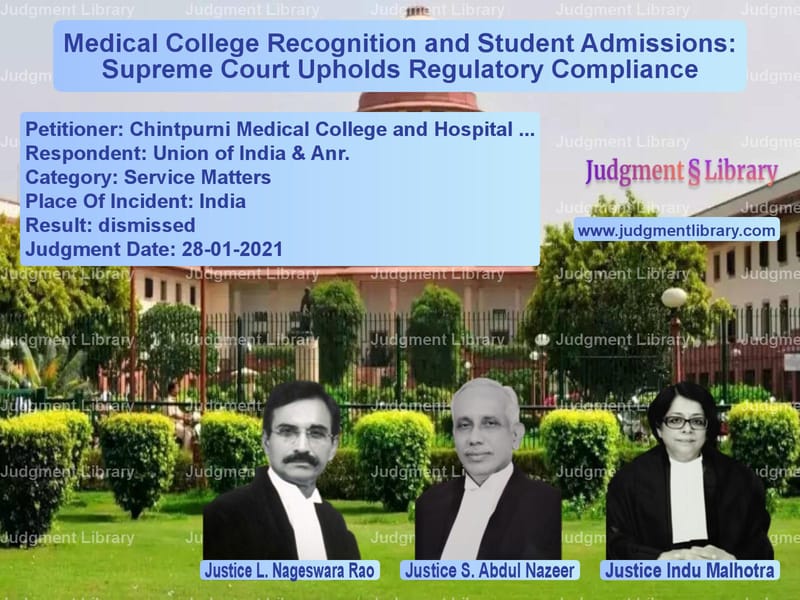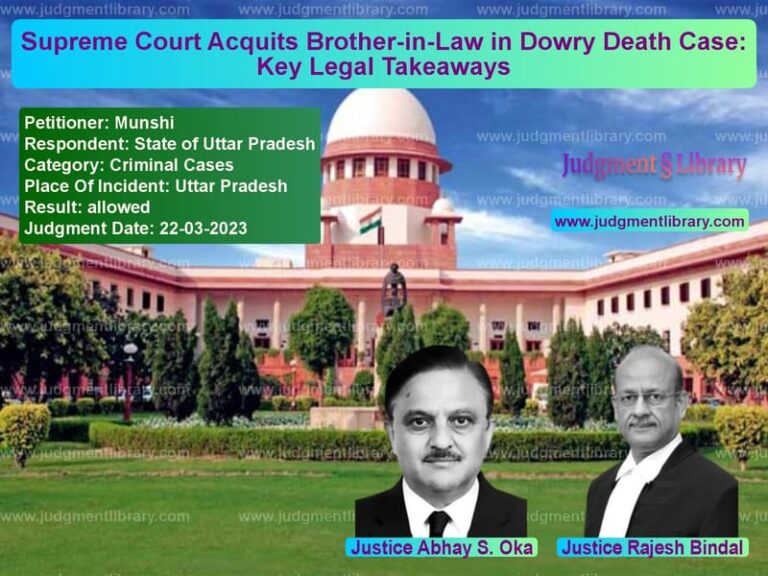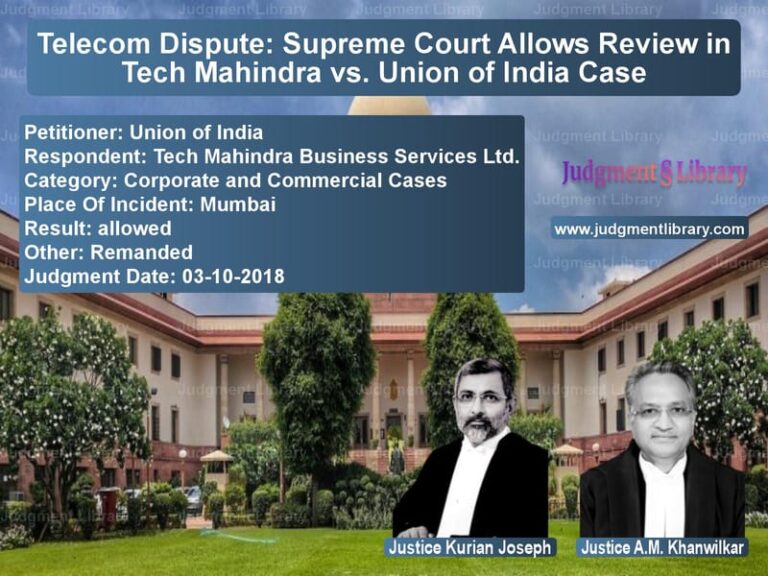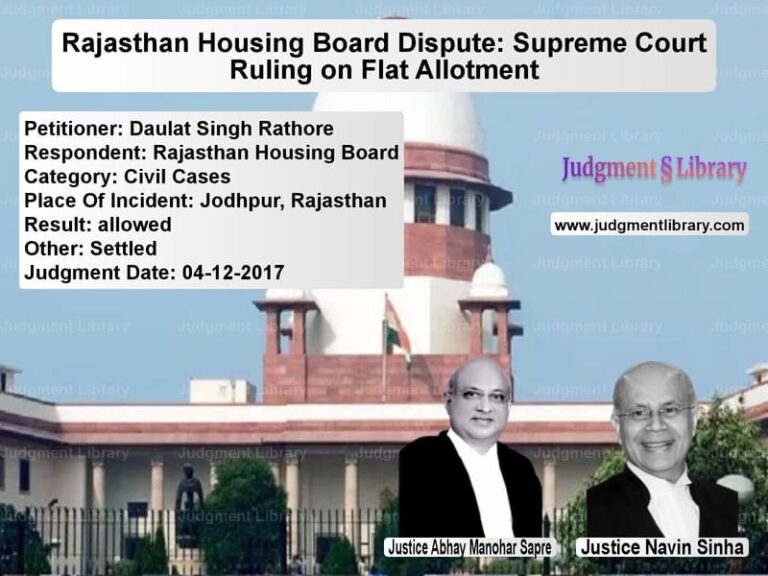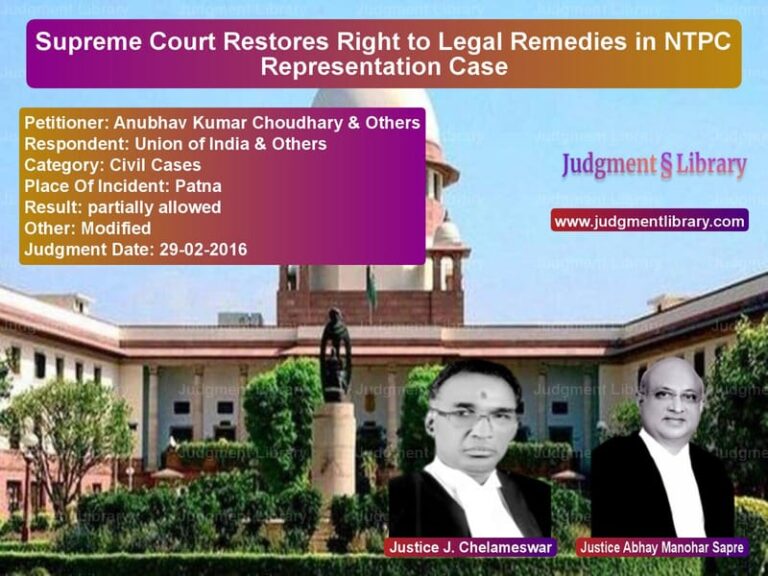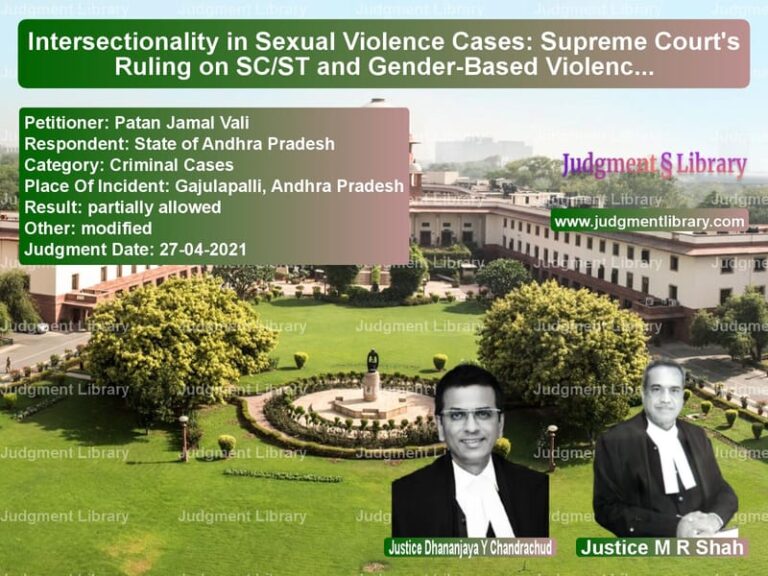Medical College Recognition and Student Admissions: Supreme Court Upholds Regulatory Compliance
The Supreme Court of India, in Chintpurni Medical College and Hospital & Anr. vs. Union of India & Anr., examined a long-standing dispute regarding medical college recognition, student admissions, and regulatory compliance. The case revolved around whether Chintpurni Medical College could admit students for the academic years 2019-2020 and 2020-2021 despite multiple prior deficiencies noted by the Medical Council of India (MCI).
The appeal challenged the Delhi High Court’s dismissal of a writ petition that sought permission for student admissions. The Supreme Court upheld the High Court’s findings, emphasizing that medical education institutions must adhere to strict quality standards before being allowed to admit students.
Background of the Case
Chintpurni Medical College sought approval to admit 150 students in its MBBS program for the 2019-2020 academic year. However, the MCI and the Board of Governors (BoG) rejected the request on May 21, 2019, citing continued deficiencies in faculty, infrastructure, and patient availability.
The college was initially granted permission in 2011 for 150 students. However, inspections over the years revealed serious shortfalls in teaching staff, hospital infrastructure, and other facilities. As a result, renewals were denied for the academic years 2012-2013 and 2013-2014. Despite multiple appeals, the deficiencies persisted, leading to further denials in 2014-2015 and beyond.
Key Legal Issues Addressed
1. Whether the College Was Eligible to Admit Students for 2019-2020
The petitioners argued that the two-year ban imposed on admissions in 2017-2018 and 2018-2019 had expired, making them eligible to admit students from 2019-2020 onwards. They claimed that further denials violated their rights.
2. Whether the College Had Rectified Deficiencies
Multiple inspections conducted by the MCI in previous years showed persistent non-compliance. Deficiencies included:
- Severe shortage of faculty (87.12%).
- Shortage of resident doctors (82.35%).
- Low patient occupancy in the hospital.
- Insufficient laboratory and diagnostic facilities.
- Unavailability of basic clinical infrastructure.
- Inadequate hostel and residential facilities for students and faculty.
The petitioners contended that they had addressed these issues, but the Court found no conclusive evidence supporting their claims.
3. Whether the High Court Had Erred in Denying Admissions
The High Court dismissed the petition, holding that the two-year ban did not automatically grant the college permission to admit students. Instead, it required further verification by the authorities.
Read also: https://judgmentlibrary.com/advocate-on-record-and-proprietary-firms-supreme-courts-clarification/
4. Whether the College Could Seek Recognition for 2021-2022
The petitioners also sought permission to admit students for the next academic year. The Court examined whether they were entitled to such relief.
Findings of the Court
1. Denial of Admissions for 2019-2020 and 2020-2021 Was Justified
The Supreme Court upheld the MCI’s decision to deny admissions for 2019-2020. It stated:
“The petitioners have repeatedly failed to rectify deficiencies despite being given multiple opportunities. Allowing student admissions without compliance would compromise the quality of medical education.”
The Court found no merit in the argument that the two-year admission ban automatically entitled the college to restart admissions.
2. The Medical Council of India Was Right to Withhold Recognition
The Court noted that several inspections revealed “serious non-compliance” in clinical and teaching standards. It emphasized:
“Medical education institutions must meet regulatory standards to ensure quality training for future doctors. Permitting admissions without adequate facilities would be detrimental to public health.”
3. No Automatic Right to Renewal of Recognition
The petitioners argued that their recognition was valid until 2021, entitling them to seek admissions. The Court clarified that:
“Recognition under the Indian Medical Council Act, 1956, does not guarantee admissions. Institutions must demonstrate ongoing compliance with educational and infrastructural requirements.”
4. College Can Apply for Recognition Renewal
While rejecting the appeal, the Court allowed the college to apply for renewal of recognition under Section 19 of the Indian Medical Council Act. However, it made clear that:
“Admissions for 2021-2022 shall be permitted only if the college rectifies all deficiencies and secures regulatory approval.”
Supreme Court’s Verdict
- The appeal was dismissed.
- The college was not entitled to admit students for 2019-2020 and 2020-2021.
- The MCI was justified in its decision to withhold recognition.
- The college was allowed to apply for renewal of recognition for 2021-2022.
Conclusion
This judgment underscores key principles in medical education regulation:
- Colleges must adhere to strict standards before admitting students.
- Past non-compliance affects future recognition and admissions.
- Medical regulatory bodies have the authority to deny admissions if deficiencies persist.
- Institutions cannot assume automatic renewal of permissions without proving compliance.
The ruling affirms the necessity of maintaining quality in medical education and ensuring that students receive training in properly equipped institutions.
Petitioner Name: Chintpurni Medical College and Hospital & Anr..Respondent Name: Union of India & Anr..Judgment By: Justice L. Nageswara Rao, Justice S. Abdul Nazeer, Justice Indu Malhotra.Place Of Incident: India.Judgment Date: 28-01-2021.
Don’t miss out on the full details! Download the complete judgment in PDF format below and gain valuable insights instantly!
Download Judgment: chintpurni-medical-c-vs-union-of-india-&-anr-supreme-court-of-india-judgment-dated-28-01-2021.pdf
Directly Download Judgment: Directly download this Judgment
See all petitions in Education Related Cases
See all petitions in Recruitment Policies
See all petitions in Judgment by L. Nageswara Rao
See all petitions in Judgment by S. Abdul Nazeer
See all petitions in Judgment by Indu Malhotra
See all petitions in dismissed
See all petitions in supreme court of India judgments January 2021
See all petitions in 2021 judgments
See all posts in Service Matters Category
See all allowed petitions in Service Matters Category
See all Dismissed petitions in Service Matters Category
See all partially allowed petitions in Service Matters Category

